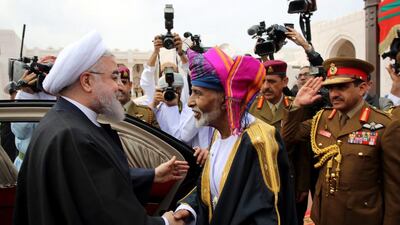Muscat // Iranian president Hassan Rouhani met with Sultan Qaboos in Muscat on Wednesday, before travelling for the first time since taking office to Kuwait for further talks aimed at reducing tensions with the GCC.
“The aim of Mr Rouhani’s visit to Muscat is to consult with Oman to look at ways that Iran can remove the hostility that exists with other Arab regional countries,” an Iranian diplomat in Muscat told The National. “The sectarian issues should not come between Iran and the Gulf states, and the focus for this visit is to seek a peaceful and lasting solution in the region that would benefit all.”
Mr Rouhani, on his second visit to Oman since his election in 2013, was greeted by Sultan Qaboos bin Said at the royal airport in Muscat. It was the Sultan’s first public appearance since November when he attended the country’s National Day celebrations in a military parade.
Iran and Saudi Arabia have been locked in a cold war as Tehran has used the turmoil first of the US invasion of Iraq in 2003 and then the Arab Spring uprisings of 2011 to increase its influence across the Middle East and bolster allied governments and militias. Riyadh has also supported militias, particularly in Syria, and intervened to reinstate the Yemeni government after it was overthrown by rebels allied to Iran.
The struggle for influence has inflamed sectarianism across the region, and tensions between Iran and the GCC have only continued to increase after seeming to peak last year.
The time may be ripe for tentative rapprochement by both sides to try to lower the pitch of hostilities. Tehran feels the pressure increasing from a new administration in Washington that has stated that it will take a take a much harder line than its predecessor, which sought to engage Iran in the hope that it would alter its behaviour after the historic nuclear deal.
The Donald Trump administration’s desire to work more closely with Saudi Arabia to contain Iran may make Riyadh more willing to talk with Tehran, and observers said it was unlikely that Mr Rouhani would meet counterparts in Kuwait City without Saudi approval.
Mr Rouhani was scheduled to hold talks with the emir, Sheikh Sabah Al Ahmad Al Sabah. It is believed they focused on reducing hostilities between Iran and the GCC.
The visit comes after a rare trip by the Kuwaiti foreign minister to Tehran last month, where he delivered a message from the GCC that reportedly laid out a basis for any future talks, including final negotiations on Emirati islands occupied by Iran, non-interference in the internal affairs of Arab countries, and dropping its support for militias including Hizbollah in Lebanon.
It is highly unlikely that Iran will agree to the demands as a basis for talks, and there may be an initial focus on lower-hanging fruit to build confidence, such as getting Iranian pilgrims back to the Haj after Iran announced a boycott of the pilgrimage last year.
Analysts in the Gulf were doubtful that Mr Rouhani’s visit would lead to a process of detente, and from the Gulf perspective was more an attempt to show that they had tried.
Oman is an outlier among the GCC, and has maintained close diplomatic and economic relations with Iran, and brokered the secret talks that eventually resulted in successful negotiations over Tehran’s nuclear programme.
Oman has hoped that it will benefit from Iran’s economic reintegration into world markets with the lifting of sanctions, and the Iranian diplomat said that Mr Rouhani planned to “seal the deal” on a US$60 billion (Dh220bn) gas pipeline project agreed to in 2013 that will export gas from Iran to Oman.
The countries agreed earlier this month on a new route that will avoid the UAE’s territorial waters.
“The gas pipeline project between Oman and Iran will be an economical milestone for the two countries,” the Iranian diplomat said. “Mr Rouhani is convinced that this [project] will also bring together all Gulf countries to address their common energy needs,” he added.
foreign.desk@thenational.ae

